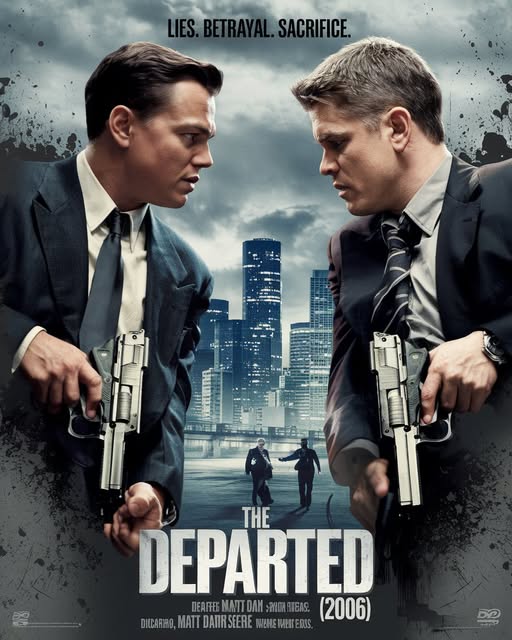The Departed – A Dance of Shadows in Boston

Related movies:
Martin Scorsese’s The Departed is not merely a crime thriller; it is a study of deception, identity, and the fragile boundaries between loyalty and betrayal. Set against the raw and unforgiving backdrop of 2000s Boston, the film drags its audience into a world where morality is fractured, and trust is as rare as redemption.
At its core lies the story of two men, destined to collide yet trapped in parallel lies. Billy Costigan, portrayed with raw desperation by Leonardo DiCaprio, is a young cop forced into the underworld as an undercover agent. His every breath is a gamble, his very existence a balancing act between survival and exposure. Across from him stands Colin Sullivan, played with icy precision by Matt Damon, a man who wears the uniform of law but bleeds loyalty to the mob.
The brilliance of Scorsese’s storytelling is that neither man is simply hero or villain. Both are shaped by circumstance, both are trapped by choices, and both find themselves spiraling toward inevitable doom. Their lives reflect one another like a dark mirror, each move echoing the other’s, until their fates entwine in tragedy.
Jack Nicholson’s role as mob boss Frank Costello is the chaotic force that anchors the film’s tension. His performance is volatile, unpredictable, and utterly magnetic, embodying corruption in its purest form. He is the devil whispering in the ears of men, a figure who understands power not as control, but as manipulation and fear.
The cinematography heightens the suffocating tension. Boston’s streets are captured in grim detail: shadowed alleyways, dimly lit apartments, and the cold sterility of police offices. Every frame breathes unease, every shot carries the weight of suspicion. The city itself becomes a character—a place where secrets hide in plain sight, and violence simmers beneath the surface.
Scorsese infuses the film with relentless pacing. There are no safe pauses, no moments where the audience is allowed to breathe freely. Every conversation could explode, every phone call could unravel carefully constructed lies. This constant sense of unease makes the film a nerve-shredding experience, a cinematic heartbeat that refuses to slow.
Thematically, The Departed is more than a mob-versus-police tale. It is about the masks we wear, the identities we construct, and the price of deception. Billy longs for freedom from his false life, yet the truth offers no safety. Colin clings to the illusion of control, yet his entire existence is built on fragility. In the end, both men are prisoners—one of fear, the other of ambition.
The supporting cast reinforces this tension. Mark Wahlberg’s sharp-tongued sergeant provides both dark humor and brutal honesty, while Martin Sheen’s calm presence adds a tragic moral weight. Each character is drawn into the storm, none untouched by the web of betrayal that consumes the story.
What elevates The Departed beyond its genre is its refusal to deliver clean resolutions. Justice is messy, morality collapses, and survival is fleeting. The film leaves us not with triumph, but with a lingering sense of futility—that in a world built on lies, truth itself becomes impossible.
Scorsese’s direction is relentless, his vision uncompromising. He crafts a film that is both thrilling and devastating, one that entertains with razor-sharp suspense yet lingers in the mind long after the credits fade. It is a masterpiece of modern crime cinema, unflinching in its portrayal of corruption and haunting in its humanity.
Ultimately, The Departed is not just about who lives or dies. It is about what remains when the masks fall, when lies collapse, and when identity is stripped bare. It is a story of men consumed by the shadows they created, a reminder that in the dance of deception, no one truly departs unscathed.











